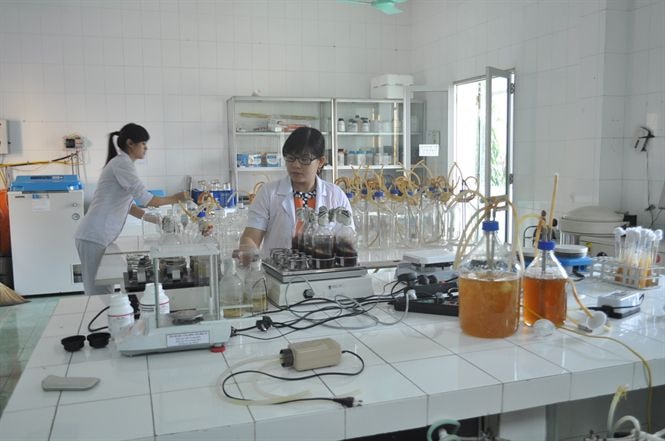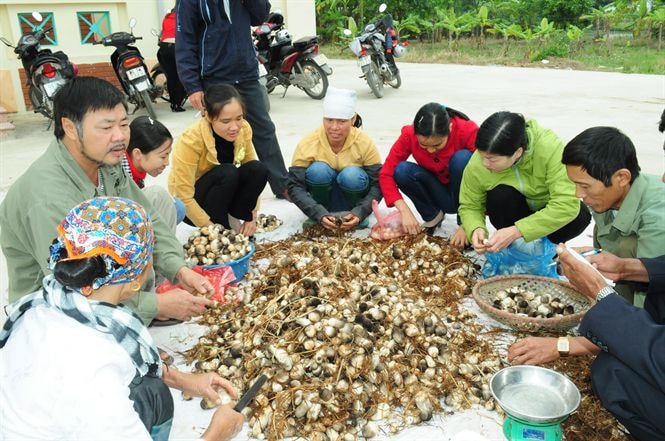Breakthrough in mushroom seed production
The Center for Plant Biotechnology (Institute of Agricultural Genetics) has basically perfected the liquid propagation technology to produce edible and medicinal mushrooms, which is considered an important breakthrough for the Vietnamese mushroom industry.
 |
| MSc. Co Thi Thuy Van is completing the final stages of the liquid method in mushroom production... |
Limitations of old technology
In the past 10 years, the edible mushroom and medicinal mushroom production industry in our country has made significant progress, but is still very slow to develop compared to other countries in the world due to little investment in research and application of advanced technology and modern equipment for production. In fact, the technology of propagating and cultivating mushrooms in Vietnam is currently mainly used on solid substrates such as agar, sawdust, rice, and cassava sticks. This is a traditional and simple method, although it is widely used, but has many limitations. That is, the propagation time at all levels is long, the quality is unstable, and the age of the seeds is not uniform throughout the entire seed bottle or seed bag. In addition, the method of propagating on solid substrates faces many difficulties in producing seeds in large quantities due to the low multiplication coefficient.
Furthermore, the process of transferring varieties is difficult to automate, is affected by many external factors, increasing the risk of infection, thereby making it difficult to control mushroom varieties. In particular, this method makes breeding materials expensive, labor costs, electricity depreciation costs, and factory costs high. In recent years, the Plant Biotechnology Center has initially researched, selected, and built technological processes for breeding and cultivating edible and medicinal mushrooms, but has only completed the technology of breeding mushrooms on solid substrates. From 2009 to now, the center has conducted research on the propagation of liquid mushrooms on an experimental scale (200 ml to 100 liters) tested on a number of varieties with results that the breeding time is shorter than traditional breeding technology, but the rate of disease infection is still high (over 30%), the ability to produce fruiting bodies is 100%. These studies are still at the exploratory level and the initial results have not yet been applied to the production and cultivation of edible and medicinal mushrooms.
In response to the practical requirements when mushrooms become one of the national products, in early 2012, the Plant Biotechnology Center began implementing the Project "Research on building a liquid-based breeding technology process for producing edible and medicinal mushrooms". The objective of the Project is to build a liquid-based breeding technology process, using edible and medicinal mushroom varieties to serve the production of commercial mushroom varieties and cultivate 7 types of mushrooms including: lingzhi, oyster mushrooms, button mushrooms, enoki mushrooms, pearl mushrooms, chicken thighs and monkey head mushrooms on an industrial scale to achieve high productivity, quality and economic efficiency.
MSc. Co Thi Thuy Van, Center for Plant Biotechnology, Project Manager, said that after 3 years of implementation (2012-2014), the project has achieved some outstanding results. Specifically: Establishing a technological process for propagating liquid-based mushrooms at intermediate levels (200 ml, 2,000 ml, 5,000 ml). Technological process for propagating commercial mushrooms (on boiled rice, cassava sticks, sawdust) using liquid-based transfer cultures. The technological process for liquid-based mushroom cultures in a 120-liter fermentation system has been tested for cultivating the 7 types of mushrooms mentioned above. The project's products have been put into trial production on 20 farms and mushroom growing enterprises and have been highly appreciated for their outstanding advantages compared to mushroom cultures produced by traditional methods.
Advantages of somatic cell propagation
According to MSc. Co Thi Thuy Van, liquid-based mushroom propagation technology is a research direction that is of particular interest to mushroom researchers because liquid-based mushroom varieties have many outstanding advantages compared to varieties on solid synthetic substrates.
 |
| Successful application of the method of producing mushroom seeds using liquid will be a revolution for the Vietnamese mushroom industry... |
Specifically, liquid mushroom strains are strains that are grown in a liquid environment, ensuring optimal conditions for nutrition, temperature, ventilation, and cultivation time, allowing mycelium to grow strongly in a deep liquid environment. “Liquid mushroom strains have many outstanding advantages compared to strains on solid synthetic substrates. Under favorable conditions, mycelium can be used after growing in a liquid environment for about 3-5 days. When transplanted to growing materials, the time for mycelium incubation can be shortened by 1/2 - 2/3. The age of the strains is uniform, the quality of the mushroom strains is stable. The vitality of the strains is strong, when transplanted into the growing medium, the mycelium recovers quickly, the ability to absorb nutrients and the speed of mycelium spreading is strong. Moreover, the cost of producing strains using this method is low, only 1/3 compared to that on solids,” said MSc. Co Thi Thuy Van.
This technology allows to obtain a large amount of mycelium biomass to make primary and secondary varieties, and can also be used directly for cultivation (third-level varieties). The above technology is also applied in the extraction of mycelium biomass used to produce medicine, spices, beverages, etc. in the food and pharmaceutical processing industry. The deep-layer fermentation method (liquid propagation) is applied to produce edible mushroom varieties such as shiitake mushrooms, purple oyster mushrooms, enoki mushrooms, straw mushrooms, black fungus, button mushrooms, tea leaves and lingzhi mushrooms. This technology originated in the United States. In recent years, China, Korea, Japan, Taiwan and Germany are countries with a very developed edible mushroom and medicinal mushroom production industry, also thanks to the application of pure large mushroom propagation technology in a liquid environment.
Along with the development of science and technology, the propagation of large mushrooms in liquid medium has been increasingly perfected and built into a standard process, which is quite popular in some countries with developed mushroom cultivation industry. Currently, there are many different processes of propagating large mushrooms in liquid form depending on the scale of production, socio-economic conditions and technological level of each country. Research and production of liquid mushroom varieties have been continuously developed for many years and have achieved initial achievements, popularizing and applying liquid mushroom propagation on an industrial scale to produce edible mushrooms and medicinal mushrooms, bringing about obvious efficiency because it can reduce production costs and improve product quality...
MSc. Co Thi Thuy Van emphasized the prospect of liquid mushroom seed technology for mushroom seed production units, applying the combination of "solid - liquid seed" in edible mushroom seed production because it not only promotes the strengths of shortening growth time, low production cost, high purity, good quality, low infection rate but also is the premise for developing mushroom seed production and cultivation on an industrial scale with very large quantities...
According to NNVN






